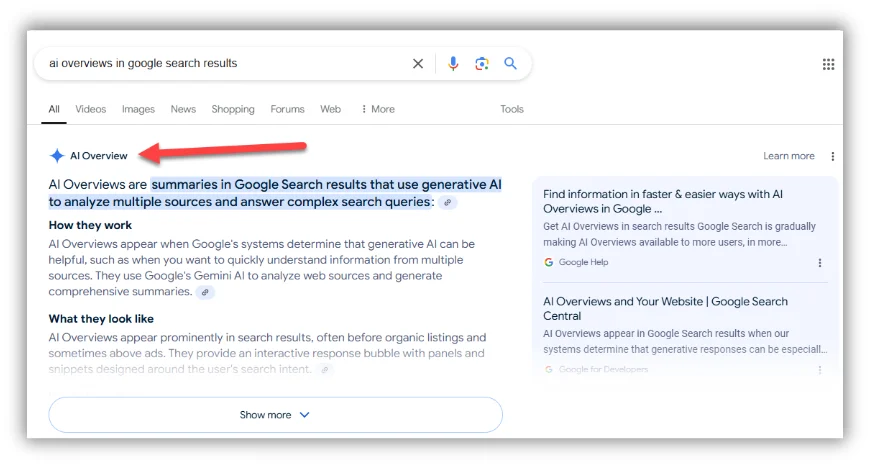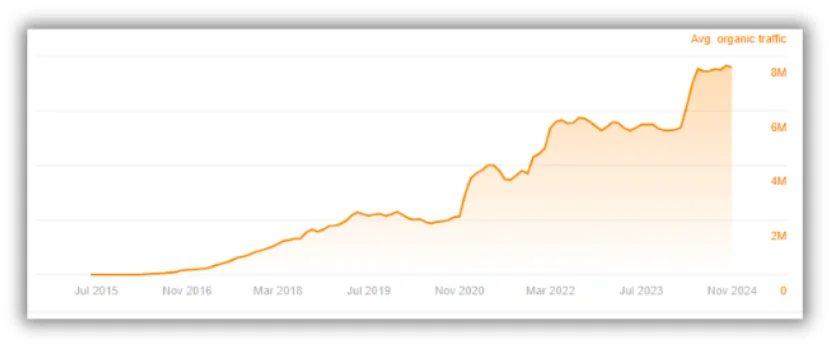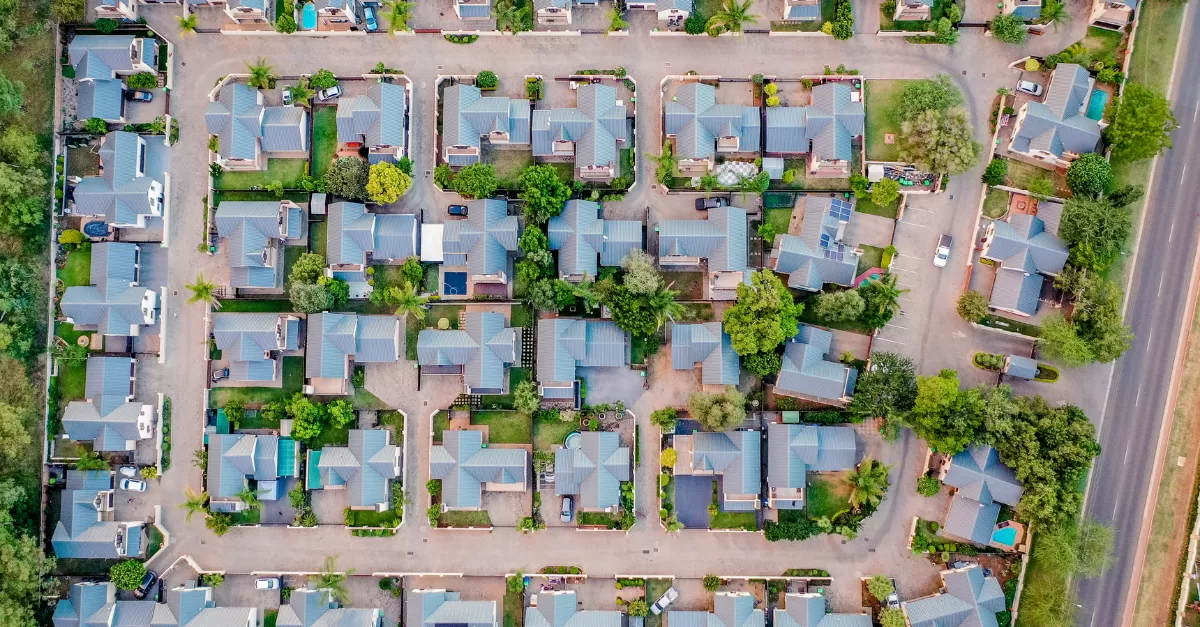A lot of 2025 SEO trend posts will give you generic predictions like “technical SEO will still matter in 2025,” or “you will need to write great content,” or that TikTok and voice search will be big.
Instead of guessing at trends for 2025 or listing SEO tactics that still work, in this article, I’ll focus on what happened in 2024, what that means for SEO, and how that should inform how you think about SEO as we enter 2025.
Contents
- How SEO evolved in 2024
- AI Overviews shook up Google SERPs
- AI-generated content was created en masse
- Google responded to AI-generated content
- Search results shifted to focus on forum and tools content
- Affiliates and niche sites were hit hard by updates
- Parasite SEO gained traction
- Google was recognized as a monopoly (and that had consequences!)
- Tips and takeaways for SEO success in 2025
7 ways SEO changed in 2024 (and not always for the better!)
Here are the top seven ways SEO changed in 2024.
1. AI Overviews shook up Google SERPs
If you’ve run informational searches on Google recently, you’ve likely seen something like this:

These are AI Overviews, AI-generated responses to queries created by Google. Three things are currently true about AI Overviews:
- In some niches for some sites, they’ve already had a massive impact.
- In some niches and for some sites, they’ve had precisely zero impact.
- Their impact is expanding.
Let’s look at the history of AI Overviews:
- Google tested AI Overviews (then called Search Generative Experience or SGE) from 2023 to 2024.
- On May 14, 2024, Google officially rolled out these overviews, calling them AI Overviews.
- Many of these results were pretty bad, even dangerous, and Google got a lot of blowback in the press for the quality of AI overviews.
- Third parties have estimated that the number of search queries impacted by AI overviews was between 7-15% in the summer of 2024.
- Those numbers continue to fluctuate, and Google expanded the reach of AI Overviews to over 100 countries at the end of October 2024.
Percentages like 7-15% don’t sound like a lot, but for a certain set of queries that might mean more like 80% of searches. Or your site might get 60-70% of its traffic from 25-50 pages, and those pages might be disproportionally impacted.
If you’re a cybersecurity software company, you may be seeing results like this one (only with ads overlaid over the AI Overview) in all of the search results where you rank in organic results:

Meanwhile, if you’re a local business trying to rank for plumbing in Sioux Falls, you likely don’t have an AI Overview within miles of your SERPs:

The results here are still Local Services Ads, Google Maps, and standard organic search. Through all of the shake ups the SERP displays, the best practices for local SEO stay relatively consistent.
How does this impact sites? For sites that have AI Overviews in a lot of their search results, there are a variety of impacts, including:
- Less traffic: Your page could be pushed down in search results, which would lead to less traffic.
- More traffic: Getting featured in AI Overviews may drive more traffic to your site.
- Inaccurate tracking results: Rank tracking tools are showing a page that is featured in AI Overviews (even if it’s well below the “load more” button and many searchers may not be seeing it) as ranking “#1.”
🚀 Free guide >> 10 Tangible & Free Ways to Get on the First Page of Google
2. AI-generated content was created en masse
The ability to push a button and—for very low costs—generate content of reasonable quality is another thing that’s had a major impact on SEO in 2024.
Originality AI estimates that the percentage of AI content ranking in the top 20 Google results has more than doubled in 2024.
Entire industries have been built around the growth of generative AI content, including:
- AI content detectors
- AI writing tools
- AI content editing services
And of course, many more are likely to pop up over time.
3. Google responded to AI-generated content
During the pandemic, people flocked to online sources to do comparison shopping. Many affiliates had quietly been ranking for all kinds of “best X” and “best X for Y” searches. With all of the new search volume around these terms, additional attention (in the form of media and users noticing) was paid to this fact.
Subsequent updates meant that these smaller affiliates were replaced with large, authoritative sites (more on this shortly).
This is a common trend in Google search results over the years. It’s happened with larger publishers cranking out thin content, with guest blog marketplaces, with niche sites, and it’s already happened with AI. The basic cycle goes something like this:
- {Thing} starts to work for ranking in Google.
- Attention starts to swirl around the fact that {thing} is working, there is an article in the tech press somewhere.
- Google takes some kind of action (sometimes manual, sometimes algorithmic).
- {Thing} may still work to some extent or with some specific adjustments, but it doesn’t work as easily or for the same people (particularly those who had been highlighted in the press).
Advice from 17 years ago still stands: Don’t make Google look stupid.
🤖 Want to use AI the right way? Free download >> Emergency Guide to AI in Marketing
4. Search results shifted to focus on forum and tools content
As Google responded to AI content, one of the biggest shifts in 2024 (a continuation of Google updates over the last couple of years) has been how aggressively “UGC” or user-generated content from forums and Q&A sites has been.
Here’s organic traffic to Reddit:

Here’s organic traffic to a niche forum focused on stargazing (many niches will have a forum or two with the same graph):

And here’s the traffic graph for Omnicalculator, a large site with calculators around topics like calculating a dog’s weight, calculating steps to calories, etc.:

Looking at where Omnicalculator has gained traffic in the last year is particularly instructive here. Some of the terms are calculator terms where they displaced other calculators or traditional articles, but here are some terms in the top 10 traffic gainers for them:
- calorie deficit
- slope
- diameter of a circle
- how to find the p value
5. Affiliates and niche sites were hit hard by updates
Google’s Helpful Content Update impacted a lot of “niche sites” or small independent publishing sites focused on a specific area (frequently focused around and dependent upon Google for traffic, which was then monetized via ads or affiliate marketing).
Some sites have seen recoveries, some have seen partial recoveries, and many have abandoned any effort to recover or rank in Google at all.
Helpful content updates have been the subject of a ton of speculation, misinformation, and agitation for those impacted. Speculation about the focus of these updates includes:
- A focus on brand strength.
- The wrong combination of not having a strong domain and having the wrong anchor text mix.
- “Over-optimization” or an overly aggressive (particularly for smaller sites with fewer/lower quality link domains pointed to their site) SEO tactics (title tags, headers, content, and links all using targeted keywords aggressively).
6. Parasite SEO gained traction
Every Google action leads to an equal and sometimes opposite reaction from SEOs.
An interesting picture is starting to form here:
- AI content is getting better and is widely and cheaply available.
- Google has aggressively favored UGC or forum content and content hosted on big brand sites like Forbes.
Enter: Parasite SEO and “Site Reputation Abuse.”
While parasite SEO didn’t start in 2024, it has become a more talked about and more heavily utilized tactic.
This manifests in a few ways:
- Reddit spam: Many people have found ways to game Reddit so that their recommendations float to the top of Reddit posts and threads that are ranking in high-traffic search results.
- Contributed articles: Marketers would pay to have an article placed on an authoritative site with their own affiliate links in the article. Often these marketers will also use low-quality (and cheap) link sources to get the articles to rank (this can work on authoritative sites, even if it frequently may not on smaller sites, and of course there’s little risk for the poster because the site getting risky and spammy links pointed to it is not their site).
- Brands doing affiliate marketing: Large brands like Forbes and CNET cranked out AI-generated articles and/or product roundup posts and generated affiliate income from that content.
And, of course, as this practice got more and more press and attention, Google responded with a “site reputation abuse” policy and update this year.
Outlook India, which had become a popular parasite SEO host, has seen surges and drops in the way of all of this:

And Forbes and CNN saw hits as well:

More and more stories along these lines continue to surface, and as they get pushed into the press and Google responds, what works and doesn’t will likely continue to change.
7. Google was recognized as a monopoly (and it had consequences!)
Google is no stranger to accusations of being a search monopoly, and it seems like their search quality rater guidelines get leaked every year, but there were some developments that were specific to 2024:
- Google had a search documentation leak.
- An endpoint exploit exposed more information about the algorithm.
- This summer Google was officially ruled a search monopoly in court, and next year the Department of Justice may force Google to take any number of actions, including spinning off and selling Chrome.
While this may not have had a visible impact on many sites trying to rank in search results in 2024, there could be any number of implications, including:
- Changes to the algorithm as Google has less behavioral data.
- Changes to Google’s behavior in general as they’re under the watchful eye of the US government and have officially been labeled a monopoly.
- Impacts on things like search result layouts, search syndication, etc, as yet unforeseen consequences of the ruling that force Google in other directions.
Google also had a creator summit–recapped by various attendees–where they admitted that in some HCU traffic drops, content was not the issue.
The future of SEO: Tips and takeaways for small businesses in 2025
Even if you’re a small, locally-focused business, any and all of these changes, trends, and events in 2024 could impact you at some point.
But what can you actually do about any of them right now?
Tips for 2025 SEO success
There are a few things that you (or the person in charge of your SEO) can do right away to address these trends:
- Focus on user-generated content and placement on large sites: If forums are showing up in relevant search results and contributed posts on larger sites are showing up prominently in search results, you’d be doing yourself a disservice if you didn’t explore how you can get your customers to comment on prominently featured forum threads or how you can get a contributed post on a publication well-positioned to rank for your targeted terms.
- Invest in tools and calculators: Even a local home services company can build cost calculators or tools to help plan out a home renovation, and these types of utilities are exactly what Google’s currently ranking for lots of relevant search terms.
- Have a strategy around AI content: Google has said they don’t explicitly penalize AI content, but AI content without any editing or guardrails can certainly get sites into trouble. You can drive highly qualified search traffic that increases leads and sales without using AI content at all, and you can incorporate carefully edited AI content into your strategy as well. Make sure you know which one your company or your agency are executing, and that you understand the risks and rewards around each.
👀 Looking for more ways to drive people to your site? Free guide >> 25 Ways to Increase Traffic to Your Website
Key takeaways to inform your 2025 SEO strategy
Additionally, there are a few things you can keep in mind as 2025 progresses:
- Monitor placements in AI Overviews and AI search results: Currently, showing up in AI search results is unlikely to have a significant impact on local business search traffic. And again: You may not have a single AI Overview in your “dentists in Dover” search results currently. That said, it’s important to start to understand how AI Overviews work, and what you’ll want to do to rank for them as they do get introduced.
- Keep up with Google’s PR offensive and upcoming court appearance: Keeping an eye on what happens in search results, what happens with Google in the press, and anticipating the likely implications is all part of a responsible search strategy. Whoever is overseeing your SEO strategy should be aware of these kinds of updates, and how they’re (actually) impacting your business’s search results (again sometimes the answer to this question will be “not at all”).
Get prepared for better SEO in 2025
Ultimately the main thing to keep in mind as you enter 2025 is to try to understand how your search results (both the rankings and the search features included in them) have changed, are changing, and may change in the future so that you can continue to generate as many leads, sales, and profits as you can from SEO in 2025.







